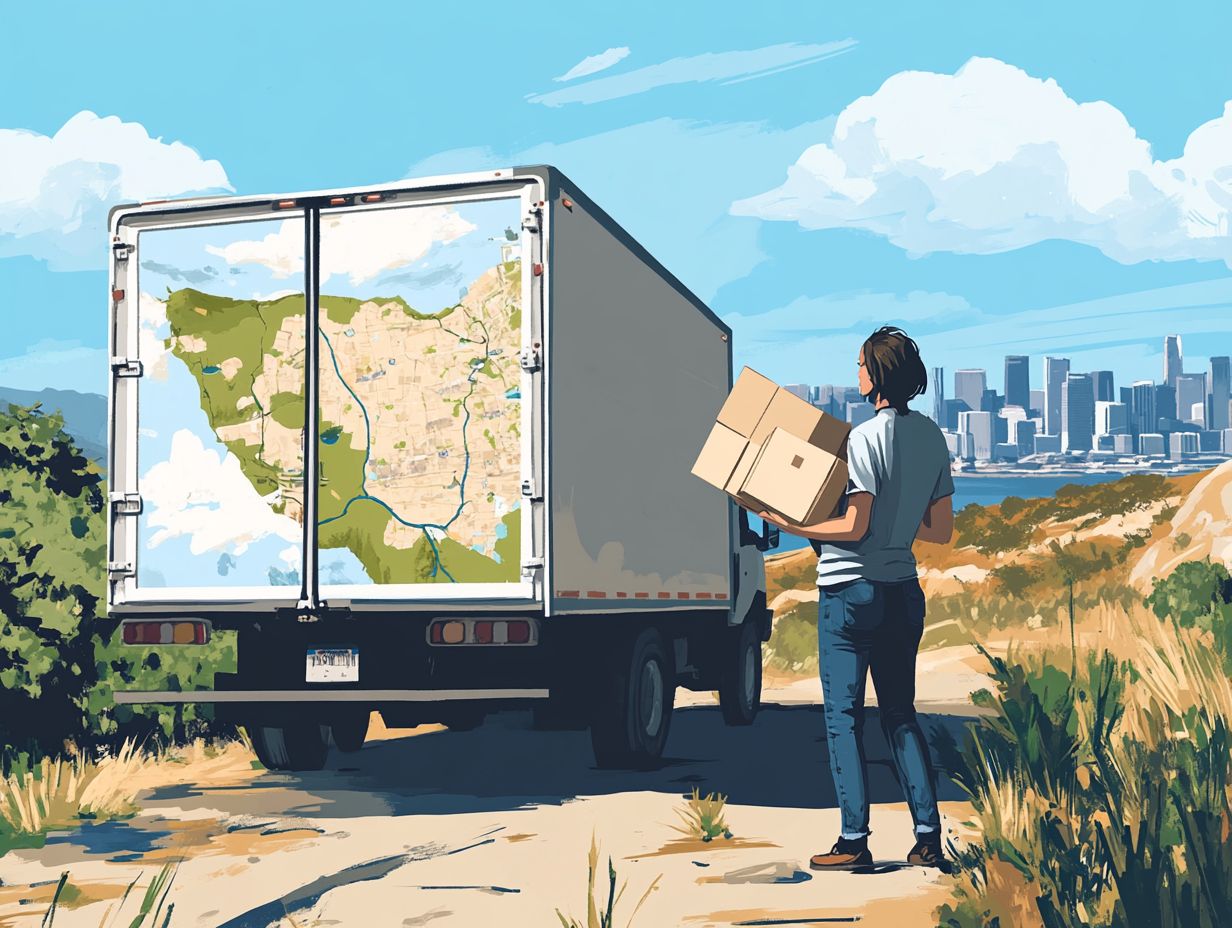What Happens When I Move to a New State?
Moving to a new state can be exciting. It brings many opportunities and challenges.
Before you dive in and start packing, consider several key factors, such as the cost of living, job market prospects, and housing options.
Once you decide to take the plunge, meticulous preparation is vital. Budgeting and researching your new home are essential. Getting used to an unfamiliar environment is also important. Every step counts.
Don t overlook the legalities updating your address and registering to vote are essential tasks that should be on your checklist.
This guide will help make your move smooth and exciting!
Contents
- Key Takeaways:
- Factors to Consider Before Moving to a New State
- Preparing for the Move
- Adjusting to a New Environment
- Legal and Administrative Tasks
- Frequently Asked Questions
- What Happens When I Move to a New State?
- Will I Need to Update My Driver’s License and Car Registration?
- Do I Need to Change My Mailing Address?
- What Happens to My Taxes When I Move to a New State?
- Will I Need to Find a New Job?
- Do I Need to Register to Vote in My New State?
- What Happens to My Health Insurance When I Move to a New State?
Key Takeaways:

- Think carefully about key factors, like the cost of living, before you move!
- Preparing for a move involves creating a budget and thoroughly researching your new state.
- Adjusting to a new environment may involve culture shock and building a new social network. Don’t forget important legal and administrative tasks, like changing your address!
Factors to Consider Before Moving to a New State
When you’re thinking about moving out of state, there are several important factors to consider. Your job situation, local amenities, the cost of living in the new area, and current housing market conditions are all essential.
By understanding these aspects, you can create a comprehensive moving budget and prepare for a smoother transition into your new community. Getting familiar with the local climate and cultural nuances can greatly enhance your adjustment process, making it easier for you to settle in and thrive.
Cost of Living
The cost of living is a crucial factor when considering a move out of state. It includes estimated expenses like housing, utilities, and daily living costs.
Evaluating this aspect requires careful analysis, especially when you compare it to your current expenses. Begin by diving into regional housing markets to uncover available options, whether you’re looking to rent or purchase a home.
It s essential to scrutinize utility rates, local taxes, and food prices to construct a thorough budget. When tallying your moving costs, remember to include transportation expenses, packing materials, and any potential storage fees.
To streamline your transition, set a timeline for establishing utility services in your new area. This ensures a smoother adjustment that aligns perfectly with your financial strategy.
Job Market and Opportunities
Evaluating the job market and opportunities in your prospective state is essential, as it directly impacts your employment situation and future career prospects.
Understanding which industries are thriving in that region can significantly enhance your job search process. Resources like local economic reports, industry forecasts, and salary surveys offer invaluable insights into expected earnings and demand for specific roles.
Aligning this information with available housing options is crucial for a seamless transition. After all, landing a job in a booming sector should go hand in hand with living in an area that fits your lifestyle and budget.
By effectively researching both markets, you can make informed decisions that pave the way for a successful move.
Housing Market and Options
Understanding the housing market and your available options is crucial when planning your move. It influences both your future living arrangements and the communities you might wish to join.
Taking the time to research local real estate trends can offer you valuable insights into emerging neighborhoods that align with your lifestyle. By examining factors such as community amenities, school ratings, and local services, you can make a well-informed decision about the ideal area for your new home.
By prioritizing these characteristics, you can ensure that your new residence meets your financial criteria and reflects your personal preferences. This ultimately enhances your living experience. Exploring online platforms, visiting local open houses, and engaging with residents can further illuminate the distinctive offerings of your potential neighborhoods.
Ready to start your moving journey? Let s get going!
Preparing for the Move

Preparing for your move means crafting a detailed moving budget that includes all anticipated expenses. This budget should cover potential costs for hiring a moving company, acquiring packing supplies, and making travel arrangements.
By outlining these elements, you ll set yourself up for a smoother transition.
Creating a Budget
Creating a moving budget is crucial. It helps you account for all estimated expenses, including moving costs and unexpected fees that can pop up.
A well-structured approach to categorizing these expenses can significantly lighten your financial load. Start by breaking down costs into clear categories such as:
- Packing supplies
- Transportation
- Temporary accommodations
For packing, consider everything from boxes and tape to bubble wrap. Transportation will take a substantial part of your budget, covering truck rentals and gas. It’s also wise to set aside funds for any temporary housing you might need during the transition.
Using budgeting apps like Mint or YNAB can be a game-changer in tracking your expenses and keeping everything organized. This leads to a much smoother moving experience.
Researching the New State
Discovering your new state is exciting! It s not just about finding a new home; it s about exploring local amenities, climate, and community characteristics that will shape your everyday life.
Look into the quality of local schools, especially if you have a family. Identify grocery stores that cater to your shopping preferences, and evaluate healthcare facilities to ensure you have access to quality medical services.
Explore the fantastic recreational activities in your new area right away! Whether it s hiking trails, parks, or sports leagues, these options will influence how you spend your leisure time.
The climate plays a pivotal role in your lifestyle as well. Think about how seasonal shifts can impact your daily routines, from outdoor activities to preparing for extreme weather conditions. Embracing these elements can lead to a more fulfilling life in your new surroundings.
Adjusting to a New Environment
Adjusting to a new environment can indeed pose its challenges. You might need to navigate the complexities of culture shock, establish a fresh social network, and manage aspects like pet registration carefully.
Dealing with Culture Shock
Culture shock is a familiar experience when you move to a new state. It impacts everything from your job situation to how you engage with your community. This phenomenon can arise when you encounter unfamiliar customs, traditions, and social norms.
To make this transition smoother, approach your new surroundings with an open mind and a readiness to adapt. Participating in local events, like festivals or community gatherings, is a fantastic way to meet people and gain insights into their values and lifestyles.
Volunteering or joining local clubs can further enhance your connections. This allows you to immerse yourself in the local culture and forge meaningful relationships.
Building a New Social Network

Building a new social network is essential after moving out of state. It offers the support and friendship needed to help you integrate smoothly into your new community.
To achieve this, explore local clubs and groups that resonate with your interests be it sports, crafts, or book discussions. Attending community events, like farmers’ markets or art fairs, can also spark casual conversations with locals.
Don t underestimate the power of social media. Joining local groups on platforms like Facebook or Meetup can be incredibly advantageous. These avenues let you discover upcoming events and connect with others who share your hobbies, making it easier to cultivate meaningful relationships in your new surroundings.
Legal and Administrative Tasks
Navigating the legal and administrative tasks that come with moving out of state is essential for ensuring a seamless transition. This includes updating your address, setting up utilities, and refreshing your driver’s license.
Each step is important for making your move as smooth as possible.
Changing Your Address
Changing your address is an important step in the moving process. It s essential to update all relevant paperwork to ensure you receive important correspondence and avoid potential complications.
- Start by notifying the post office. You can typically handle this online or in person.
- Next, inform banks, financial institutions, and credit card companies to ensure your financial statements follow you to your new location.
- Update your contact details with utilities, insurance providers, and subscription services to prevent service interruptions.
Keeping your documentation organized like confirmation emails is crucial for a smooth transition. With an organized approach, you can avoid delays and adjust to your new address more easily.
Updating Your Driver’s License and Vehicle Registration
Updating your driver’s license and vehicle registration is an important legal responsibility you need to tackle soon after moving out of state. Visit the DMV (Department of Motor Vehicles) to start this process.
Gather the necessary documents such as proof of identity, residency, and your Social Security number. You might need your current driver’s license, utility bills, or lease agreements.
Once everything is sorted, schedule an appointment at your local DMV. Be ready to pay a fee, which varies by state usually between $20 and $60. Complete this task within 30 days of your move to comply with state laws and avoid penalties.
Registering to Vote
Registering to vote is a civic duty you should prioritize right after your move. This ensures all your paperwork is in order so you can make your voice heard in local elections.
Research the voter registration requirements in your new state, as these can differ. Typically, you ll need to provide some form of identification, such as a driver s license or utility bill, to establish your residency.
Be aware of registration deadlines, as many states require you to register weeks before an election. Make sure your voice counts by participating in the democratic process and engaging with your community.
Frequently Asked Questions

What Happens When I Move to a New State?
Moving to a new state can be exciting but overwhelming. Here are some common questions to help you understand what to expect.
Will I Need to Update My Driver’s License and Car Registration?
Yes, when you move to a new state, you must update your driver’s license and car registration to comply with state laws. Research the specific requirements for your new state, as there is often a time frame for doing this.
Do I Need to Change My Mailing Address?
Yes, it s important to change your mailing address when moving to a new state. This ensures your mail is forwarded to your new address, so you don’t miss any important documents. You can easily change your address with the post office online or in person.
What Happens to My Taxes When I Move to a New State?
Each state has its own tax laws. When you move, you will need to file taxes in both your previous state and your new state for that tax year. It’s crucial to research the tax laws in your new state and consult a tax professional for advice on filing, as outlined in this guide on what to do when moving to a new state.
Take the next steps necessary for your move today!
Will I Need to Find a New Job?
Whether you need a new job depends on your current position. Some jobs let you work remotely. Others may require you to find a job in your new state.
Research the job market in your new state. Start looking for opportunities before your move.
Do I Need to Register to Vote in My New State?
Yes, you must register to vote in your new state after moving. Every state has its own voter registration process.
Research the requirements and register before upcoming elections.
What Happens to My Health Insurance When I Move to a New State?
If your health insurance is through your employer, check with your HR department about transferring your coverage. For individual health insurance, research the options in your new state.
Make the necessary changes to your coverage.






